欧盟反倾销规则特殊点
如何应对欧盟反倾销
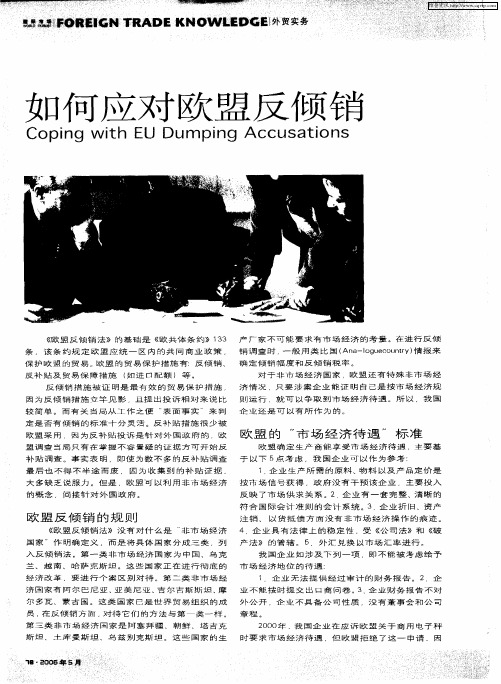
因 为 反 倾 销 措 施 立 竿 见 影 ,且 提 出 投 诉 相 对 来 说 比 则 运 行 ,就 可 以 争 取 到 市 场 经 济 待 遇 。 所 以 , 我 国
较 简 单 。 而 有 关 当 局 从 工 作 之 便 表 面 事 实 来 判 企 业 还 是 可 以 有 所 作 为 的 。
_
。 灞 鼎 8 _ 黑 !l 。 鄹 l _ _《_ , 9 I ■ !I I- 曩
、
_
: 强 tj | 0避i 薯 褥0 ≯ 0≯露霉 强 ~ 磐 鬻| 臻 ij 维普资讯 舞 一 茹
时 要 求 市 场 经 济 待 遇 但 欧 盟 拒 绝 了 这 一 申 请 . 因
。
1 叠 o ar o 器霉 5 l_ l 月 ll ¨ u
≯ ≥
维普资讯
外贸实 F RE Gi Tl O I N: l AD置- KNOW L DGEtb E ~l l 惠 i
0 :¨’ ll | . “ … “
TRADE- lOW L DGE 外贸 ‘ N E l 实务
| . l l 0 l l l 1 00- l _ 0l 0 0
“ 囊 j ∞
女 应 对 欧 盟 反 倾 销 口
Copi ih EU Dum pi ng w t ng Accus i atons
济 国家 有 阿 尔 巴 尼 亚 、 美 尼 亚 、 尔 吉斯 斯 坦 、 亚 吉 摩
1
.
企 业 无 法 提 供 经 过 审 计 的 财 务 报 告 。 2.企
业 不 能 按 时 提 交 出 口 商 问 卷 。 企 业 财 务 报 告 不 对 3.
尔 多 瓦 、蒙 古 国 。这 类 国 家 已 是 世 界 贸 易 组 织 的 成 外 公 开 ,企 业 不 具 备 公 司 性 质 .没 有 董 事 会 和 公 司
欧盟指令38496反倾销条例中文版
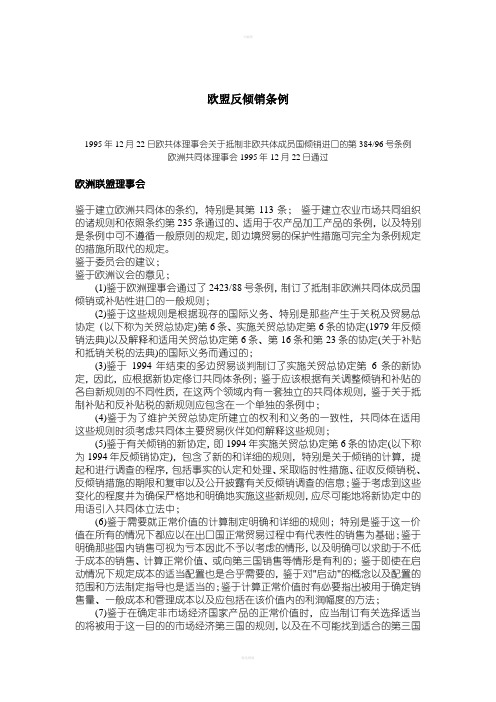
欧盟反倾销条例1995年12月22日欧共体理事会关于抵制非欧共体成员国倾销进口的第384/96号条例欧洲共同体理事会1995年12月22日通过欧洲联盟理事会鉴于建立欧洲共同体的条约,特别是其第113条;鉴于建立农业市场共同组织的诸规则和依照条约第235条通过的、适用于农产品加工产品的条例,以及特别是条例中可不遵循一般原则的规定,即边境贸易的保护性措施可完全为条例规定的措施所取代的规定。
鉴于委员会的建议;鉴于欧洲议会的意见;(1)鉴于欧洲理事会通过了2423/88号条例,制订了抵制非欧洲共同体成员国倾销或补贴性进口的一般规则;(2)鉴于这些规则是根据现存的国际义务、特别是那些产生于关税及贸易总协定(以下称为关贸总协定)第6条、实施关贸总协定第6条的协定(1979年反倾销法典)以及解释和适用关贸总协定第6条、第16条和第23条的协定(关于补贴和抵销关税的法典)的国际义务而通过的;(3)鉴于1994年结束的多边贸易谈判制订了实施关贸总协定第6条的新协定,因此,应根据新协定修订共同体条例;鉴于应该根据有关调整倾销和补贴的各自新规则的不同性质,在这两个领域内有一套独立的共同体规则,鉴于关于抵制补贴和反补贴税的新规则应包含在一个单独的条例中;(4)鉴于为了维护关贸总协定所建立的权利和义务的一致性,共同体在适用这些规则时须考虑共同体主要贸易伙伴如何解释这些规则;(5)鉴于有关倾销的新协定,即1994年实施关贸总协定第6条的协定(以下称为1994年反倾销协定),包含了新的和详细的规则,特别是关于倾销的计算,提起和进行调查的程序,包括事实的认定和处理、采取临时性措施、征收反倾销税、反倾销措施的期限和复审以及公开披露有关反倾销调查的信息;鉴于考虑到这些变化的程度并为确保严格地和明确地实施这些新规则,应尽可能地将新协定中的用语引入共同体立法中;(6)鉴于需要就正常价值的计算制定明确和详细的规则;特别是鉴于这一价值在所有的情况下都应以在出口国正常贸易过程中有代表性的销售为基础;鉴于明确那些国内销售可视为亏本因此不予以考虑的情形,以及明确可以求助于不低于成本的销售、计算正常价值、或向第三国销售等情形是有利的;鉴于即使在启动情况下规定成本的适当配置也是合乎需要的,鉴于对"启动"的概念以及配置的范围和方法制定指导也是适当的;鉴于计算正常价值时有必要指出被用于确定销售量、一般成本和管理成本以及应包括在该价值内的利润幅度的方法;(7)鉴于在确定非市场经济国家产品的正常价值时,应当制订有关选择适当的将被用于这一目的的市场经济第三国的规则,以及在不可能找到适合的第三国时,可在任何其他合理的基础上来确定正常价值的规则;(8)鉴于确定出口价格和在有必要从第一次公开市场价格出发重新推算出口价格的情形下列举某些调整项目是有益的;(9)鉴于为保证在出口价格与正常价值之间进行公平比较,应列举可能影响价格和价格可比性的那些因素,应制定有关何时及如何进行调整的明确规则,包括应避免任何重复调整的规则;鉴于虽然各个出口价格因其客户、地区或期限等原因不同时仍可以与平均正常价值进行对比,但也有必要规定,可以使用平均价格比较出口价格和正常价值;(10)鉴于应制订明确、详细的规则指导那些与确定倾销进口商品是否已造成实质性损害或实质性损害的威胁有关的因素;鉴于在证明有关进口商品的数量和价格水平对共同体某一产业所遭受的损害负有责任时,应注意其他因素特别是共同体现有市场条件的作用;(11)鉴于应限定"共同体产业"这一术语,应规定与出口商有关联的当事人应从"产业"中排除以及应限定"关联"一词的含义;鉴于有必要规定以共同体某个地区的生产者的名义提起反倾销,以及有必要对该地区的定义制订指南;(12)鉴于有必要规定可以提起反倾销申请的当事人,包括共同体产业应该支持的程度,以及该申请应包括的有关倾销、损害和因果关系的信息;鉴于应规定有关驳回申请或者开始调查的程序;(13)鉴于有必要规定利害当事人应得到关于当局所需信息的通知,应有充分机会去提供所有相关证据及维护其利益的方法;鉴于应明确制定在调查期间应遵循的那些规则和程序,特别是如果利害当事人的意见和信息将被调查机关考虑,利害当事人在一个特定期限内据以进行自我通报、发表意见和提供信息的那些规则;鉴于应规定在哪些情形下利害当事人可以获得并评论由其他利害当事人所提供的信息的;鉴于在收集信息方面成员国和委员会之间应当进行合作;(14)鉴于有必要规定征收临时反倾销税的条件,包括这种征收不早于开始调查之日起60天和不晚于此日后9个月的条件;鉴于因行政管理的原因,有必要规定反倾销税由委员会征收,或者直接征收期限为9个月的临时反倾销税或者征收期限为6个月和3个月两个阶段的临时反倾销税;(15)鉴于有必要规定接受消除倾销和损害的承诺以代替征收临时或最终反倾销税的程序;鉴于应规定违反或者撤销承诺的后果,以及在有违反承诺之嫌或者需要进一步调查以补充调查结果情况下可以征收临时反倾销税;鉴于在接受承诺时应注意提出的承诺及其实施不会导致反竞争的行为;(16)鉴于有必要规定不论是否采取最终措施,案件通常应在开始调查之日起12个月内结束,并决不能超过15个月;鉴于在微量倾销或在损害可予忽略不计时,应终止调查或者诉讼,应对这些术语予以定义;鉴于在征收反倾销税时,有必要规定终止调查,在征收较少数额的反倾销税就可消除损害的情况下,有必要规定反倾销税应低于倾销幅度,以及有必要规定在抽样的情况下计算反倾销税程度的办法;(17)鉴于有必要规定如认为适当时可追溯征收临时反倾销税,有必要说明那些可能引起追溯适用反倾销税以免削弱将适用的最终反倾销措施的情况;鉴于也有必要规定反倾销税可追溯适用于违反或者撤销承诺的情况;(18)鉴于有必要规定反倾销措施5年后将终止,除非复审调查表明这些措施应继续实施;鉴于在有充分证据表明情况已变化的场合,应规定临时复审或调查,以确定是否同意退还反倾销税;鉴于作出以下的规定也是合适的,在重新计算倾销致使有必要重新计算出口价格时,如该反倾销税反映在受共同体反倾销制裁的商品的价格上,则该反倾销税不应作为在进口和转卖期间发生的成本;(19)鉴于在出口商通过补偿安排方式承受反倾销税和反倾销措施没有反映在受共同体反倾销制裁的商品的价格上时,有必要对出口价格和倾销幅度的重新估算作出特别规定;(20)鉴于尽管一个单独的关贸总协定部长决议承认规避是个问题并已将其提交到关贸总协定反倾销委员会去解决,但1994年反倾销协定并没有包括关于规避反倾销措施的条款;鉴于迄今在此问题上多边谈判的失败和关贸总协定反倾销委员会对此还未作出结论,从而有必要在共同体立法中增加新的条款,以解决包括在共同体内或者在第三国内进行的以规避反倾销措施为主要目的货物组装在内的做法;(21)鉴于在市场条件出现暂时性变化,使继续征收反领销税暂时显得不合适的情况下,允许中止反倾销措施是可取的;(22)鉴于有必要规定被调查的进口货物进口时应当登记,以便随后能够对这些进口货物适用反倾销措施;(23)鉴于为确保正确实施反倾销措施,成员国必须监督并向委员会报告被调查的或被实施反倾销措施的产品的进口贸易以及依照本规则所征收的反倾销税数额;(24)鉴于有必要规定,定期地或在特殊的调查阶段,同咨询委员会协商;鉴于该委员会应当由成员国的代表组成并由委员会的一名代表担任主席;(25)鉴于应规定进行实地核查以审核当事人提供的有关倾销和损害的信息,但实地核察应以收到对调查问卷的合适答复为条件;(26)鉴于应在当事人或者交易数目巨大的情况下规定抽样的调查方法以在法定的期限内完成调查;(27)鉴于有必要规定,在当事人不能令人满意地进行配合时,可以使用其他信息作出裁定,与当事人相配合的情况比,该信息可能对该当事人较为不利;(28)鉴于有必要对处理机密信息作出规定以便商业秘密不被泄漏;(29)鉴于应规定向那些有权得到这种待遇的当事人适当披露基本事实和审议;鉴于这种披露应适当考虑共同体内作出决定的过程,并在允许当事人维护自身利益的期限内进行;(30)鉴于应当建立一个解决争议的行政机构,有关反倾销措施是否符合包括消费者利益在内的共同体利益的争议可由它解决;应规定一个提供这类信息和有关当事人的知情权的期限;(31)鉴于理事会通过制定1994年12月22日欧共体关于抵制非欧共体成员国倾销进口的第3283/94号规则,废降了欧洲经济共同体第2423/88号规则,并建立了一个新的抵彻非欧共体成员国倾销进口的共同制度;(32)鉴于欧共体第3283/94号规则条文中的重大错误在公布时很明显;(33)此外,鉴于该规则已经两次修改;(34)鉴于为了法律的清楚、透明和法律确定性,该规则因此应被废除和取代,但这不影响根据该规则或根据欧洲经济共同体第2423/88号规则已提起的反倾销诉讼。
欧洲联盟的国际贸易规则

欧洲联盟的国际贸易规则随着全球化的深入发展,国际贸易在全球范围内得到了迅速的增长。
在这一背景下,欧洲联盟(European Union)作为一个重要的国际经济组织,制定了一系列的国际贸易规则,以促进欧盟成员国之间与其他国家之间的贸易发展。
本文将介绍欧盟的国际贸易规则,并探讨其对全球贸易的影响。
一、欧盟的共同商业政策欧盟的共同商业政策是指欧盟成员国对非成员国进行贸易和外经关系的方式和原则。
根据《里斯本条约》(Treaty of Lisbon)第206条,欧盟的贸易政策应遵守一些基本原则,如公正贸易、保护环境与消费者利益等。
同时,欧盟也致力于推进自由贸易并与其他国际组织进行合作,以增强全球贸易体系的稳定性。
二、欧盟的关税与非关税壁垒欧盟制定了一套完善的关税制度,其中包括进口税(Import duties)和出口税(Export duties)。
进口税涉及到欧盟成员国从非成员国进口的商品征收的税费,而出口税则是指欧盟成员国出口商品时可能需要支付的税费。
此外,欧盟还设立了一些非关税壁垒,如进口配额(Import quotas)、反倾销措施(Anti-dumping measures)和卫生检疫要求(Sanitary and phytosanitary requirements)等,以保护本国产业的利益。
三、欧盟的优惠制度与自由贸易协定为促进与其他国家之间的贸易合作,欧盟与一些部分发展中国家签署了一系列的优惠制度与自由贸易协定。
这些协定对涉及的商品降低或取消了关税税率,以便扩大贸易规模、促进经济发展。
例如,欧盟与非洲、加勒比和太平洋国家(ACP国家)签署了《经济伙伴协定》(Economic Partnership Agreements),为这些国家提供了更好的市场准入条件。
四、欧盟与世界贸易组织的关系作为世界贸易组织(World Trade Organization)的成员,欧盟在国际贸易中扮演着重要的角色。
欧盟对华反倾销成因分析

2 . 中国的 出 口商 品 附 加值 相 对 偏 低 ,企 业 进军 国际 市 4 场 的策 略有误
相 比于 欧盟 国家 的企 业 ,我 国企业 和产 品 的 “ 势 ” 优 往 往成 为欧盟 对我 国进 行反 倾 销 的 “ 劣势 ”,这 主要 表 现 为 :①竞 争 中往往 处 于明显 的有利 地位 ,尤 其是在 此基 础
影响 。
上 的专业 化 分 工 生 产 的 出 口产 品 的 价 格 优 势 更 为 明显 。 ② 技术水 平普 遍较 低 , 而造 成合 理 、正常 的低成 本 ,容 从 易遭到 反倾 销调查 。③ 产业 结构不 合理 。我 国 目 经济 结 前
构 尚不合 理 ,行 业 发 展 缺 乏 长 远规 划 , 比较 注 重 眼 前 利
求 ,其程 序简 便 易行 ,便 于 实施 ,能 够有效 排斥 进 口又 不 易招致 报复 。
中国商 品 的流入 十分警 惕敏 感 的现象 。同 时 ,由于在社 会
依据 。
在 国外遭 反倾 销诉 讼 时 ,我 国企 业 不 应诉 或 应 诉不 积 极 , 国外反倾 销 当局 以本 国提起 诉 讼 企业 的一 面之 词 为 依据 ,
必 然导 致对 我 国反倾销 的指 控得 逞 。
1 我国产品面临欧盟的反倾销指控呈现出的特点 . 2
第 一 ,除非 企 业 获 得 市 场 经 济 地 位 ,欧 委 会 将 选 择 “ 替代 国标 准 ” 确 定 我 国 企 业 出 口产 品 的 “ 常 价 值 ” 正 。 第二 ,除非 企业 获得 个别待 遇 ,欧委 会将 对我 国所 有 出 口 商计算 出一 个加 权平 均 出 口价格 。第 三 ,反倾 销指 控涉 及 的产 品种类 有扩 大 的趋 势 ,且 涉 及 金额 越 来 越 大 。第 四 ,
欧盟反倾销规则非市场经济国家问题研究
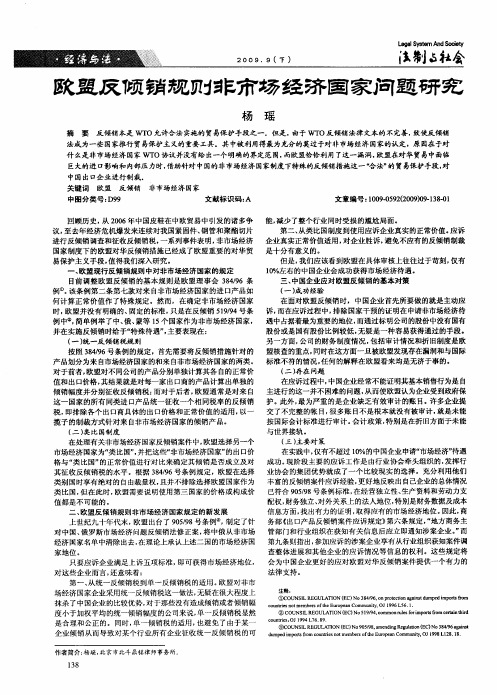
20 9.9(下 ) 0
{占 I 缸金 ; I
欧盟反倾 销规则非市场经挤 国家问题销 本是 WT O允许 合 法实施 的贸 易保护 手段 之一 .但是 , 由于 WT O反 倾销 法律 文本 的 不完善 , 致使反 倾销
一
国家制 度下 的 欧盟对 华 反倾销 措施 已经 成 了欧盟 重要 的对 华 贸 是十 分有意 义的 。 但是 , 我们 应该 看到 欧盟在 具 体审 核上 往往过 于苛刻 , 仅有
、
1%左 右的 中国企业 会成 功获 得市 场 经济待 遇 。 0 三、 中国企业 应对 欧盟 反倾 销的 基本 对策
( ) 功经验 一 成 例0 该条 例第 二条 第七款 对来 自非 市场经 济 国家 的进 口产 品如 。 何 计算 正 常价 值作 了特 殊规 定 。然而 ,在确 定非 市场 经济 国家 在面 对欧盟 反倾 销 时 ,中 国企业 首先 所要 做 的就是主 动应 而 排 时 , 盟并 没有 明确 的 、 欧 固定 的标准 , 只是在 反倾 销 5 99 号 条 诉 , 在应诉 过程 中 , 除国家 干预 的证 明在 申请非 市场经 济待 1/4 例 中0 简单例 举 了中 、 、 , 俄 蒙等 1 个 国家 作为 非市场 经 济 国家 , 遇 中 占据着最 为重要 的地位 , 5 而通 过标 明公 司的股份 中没 有 国有 股 份或 是国有股 份 比例较 低 , 疑是 一 种容 易获得通 过 的手 段 。 无 并在 实施 反倾 销时给 于“ 特殊待 遇” 主要 表现在 : , ( ) 一 反 倾 销 税 规 则 一 统 另一方 面 , 公司 的财务 制度 情况 , 包括 审计情 况和折 旧制 度是 欧 同时在这方 面一 旦被 欧盟发现 存在漏 洞和与 国际 按照 349 8/6号条例 的规 定 , 先 需要将 反倾 销措 施针 对的 盟 核查 的重点 。 首 产 品划分 为来 自市场经济 国家 的和来 自非市场 经济 国家 的两类 。 标准不 符 的情 况 , 何 的解释 在 欧盟看 来均 是无济 于事 的。 任 对于 前者 , 欧盟对 不 同公司的产 品分别单 独计算 其各 自的正常价 ( ) 二 存在 问题 值和 出 口价格 , 结果就 是对每 一家 出 口商 的产 品计 算 出单独 的 其 在 应诉过程 中 , 中国企业经 常 不能证 明其基本 销售行 为是 自 从 倾销 幅度 并分 别征 收 反倾 销税 ; 而对 于后 者 , 欧盟 通常 是对 来 自 主进行 的这一并 不 困难 的 问题 , 而使欧盟 认为企 业受到政府 保 此 最 许 这 一 国家 的所有 同类 进 口产品 统一 征收 一个相 同税率 的反 倾销 护 。 外, 为严重 的是 企业缺 乏 有效 审计 的账 目。 多企业 提 很 就 税, 即排 除各个 出口商具 体的 出 口价 格和 正常价 值 的适用 , 以一 交 了不完整 的帐 目, 多账 目不 是根本 就没 有被 审计 , 是未能 揽 子 的制裁 方式针 对 来 自非 市场 经济 国家 的倾销 产 品 。 按 国际会计 标准 进行 审计 。 会计 政 策 , 别是 在折 旧方面 于未能 特
欧盟反倾销税率名录
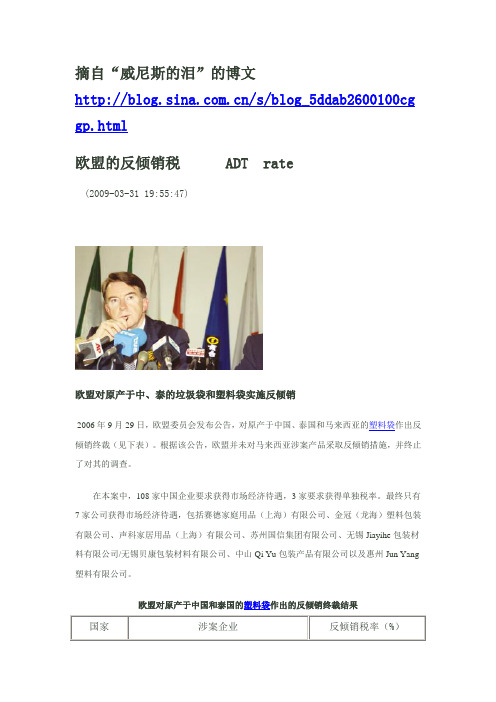
摘自“威尼斯的泪”的博文/s/blog_5ddab2600100cg gp.html欧盟的反倾销税ADT rate(2009-03-31 19:55:47)欧盟对原产于中、泰的垃圾袋和塑料袋实施反倾销2006年9月29日,欧盟委员会发布公告,对原产于中国、泰国和马来西亚的塑料袋作出反倾销终裁(见下表)。
根据该公告,欧盟并未对马来西亚涉案产品采取反倾销措施,并终止了对其的调查。
在本案中,108家中国企业要求获得市场经济待遇,3家要求获得单独税率。
最终只有7家公司获得市场经济待遇,包括赛德家庭用品(上海)有限公司、金冠(龙海)塑料包装有限公司、声科家居用品(上海)有限公司、苏州国信集团有限公司、无锡Jiayihe包装材料有限公司/无锡贝康包装材料有限公司、中山Qi Yu包装产品有限公司以及惠州Jun Yang 塑料有限公司。
欧盟对原产于中国和泰国的塑料袋作出的反倾销终裁结果国家涉案企业反倾销税率(%)附件一中国获得8.4%反倾销税率的92家涉案企业名称1. BEIJING LIANBIN PL AS TIC & PRINTING CO LTD.2.Changle Beihai Plastic Products Co., Ltd.3. CHANGLE BEIHAI PL AS TIC PRODUCTS CO., LTD.4. CHANGLE UNITE PL AS TIC PRODUCTS CO., LTD.5. CHANGLE HUALONG PL AS TIC PRODUCTS CO LTD.6.CHANGLE SHENGDA RUBBER PRODUCTS CO., LTD. Changle7.CHANGZHOU HUAGUANG PL AS TIC PRODUCTS CO., LTD. Wujin8.CHEONG FAT PL AS TIC BAGS (CHINA) PRINTING FACTORY Shenzhen9.CHUN HING PLASTIC PACKAGING MANUFACTORY LTD Hong Kong10.CHUN YIP (SHENZHEN) PLASTICS LIMITED Shenzhen11.CROWN POLYETHYLENE PRODUCTS (INT`L) LTD. Hong Kong12.DALIAN JINSHIDA PACKING PRODUCTS CO., LTD Dalian13.DONG GUAN HARBONA PL AS TIC & METALS FACTORY CO., LTD. Dongguan14.DONGGUAN CHERRY PLASTIC INDUSTRIAL, LTD Dongguan15.DONGGUAN FIRSTWAY PL AS TIC PRODUCTS CO., LTD Dongguan16.DONGGUAN MARUMAN PLASTIC PACKAGING COMPANY LIMITED Dongguan17.DONGGUAN NAN SING PLASTICS LIMITED Dongguan18.DONGGUAN NOZAWA PL AS TIC PRODUCTS CO. LTD Dongguan19.DONGGUAN RUI LONG PLASTICS FACTORY Dongguan20.FOSHAN SHUNDE KANGFU PL AS TIC PRODUCTS CO., LTD. Shunde21.FU YUEN ENTERPRISES CO. Hong Kong22.GOLD MINE PLASTIC INDUSTRIAL LIMITED Jiangmen23.GOOD-IN HOLDINGS LTD. Hong Kong24.HANG LUNG PLASTIC FACTORY (SHENZHEN) LTD Shenzhen25.JIANGMEN CITY XIN HUI HENGLONG PLASTIC LTD. Jiangmen26.JIANGMEN TO PT YPE PL AS TIC PRODUCTS CO., LTD. Jiangmen27.JIANGMEN XINHUI FE NGZE PLASTIC COMPANY LTD. Jiangmen28.JIANGYIN BRAND POLYTHENE PACKAGING CO., LTD. Jiangyin29.JINAN BAIHE PL AS TIC PRODUCTS COMPANY LIMITED Jinan30.JINAN CHANGWEI PL AS TIC PRODUCTS CO., LTD. Jinan31.JINAN CHENGLIN PL AS TIC PRODUCTS COMPANY LTD. Jinan32.JINAN MIN FE NG PLASTIC CO., LTD. Jinan33.JINYANG PACKING PRODUCTS (WEIFANG) CO. LTD Qingzhou34.JUXIAN HUACHANG PLASTIC CO., LTD Liuguanzhuang35.JUXIAN HUAYANG PL AS TIC PRODUCTS CO., LTD Liuguanzhuang36.KIN WAI POLY BAG PRINTING LTD. Hong KongIZHOU JINYUAN PLASTICS INDUSTRY & TRADE CO., LTD. LaizhouIZHOU YUANXINYIE PLASTIC MACHINERY CO., LTD. Laizhou39.LICK SAN PL AS TIC BAGS (SHENZHEN) CO., LTD. Shenzhen40.LINQU SHUNXING PL AS TIC PRODUCTS CO. LTD Linqu41.LONGKOU CITY LONGDAN PLASTIC CORPORATION LTD. Longkou42.NEW CARING PLASTIC MANUFACTORY LTD. Jiangmen43.NEW WAY POLYPAK DONGYING CO., LTD. Dongying44.NINGBO HUASEN PLASTHETICS CO., LTD. Ningbo45.NINGBO MARUMAN PACKAGING PRODUCT CO. LTD. Ningbo46.POLY POLYETHYLENE BAGS AND PRINTING CO. Hong Kong47.QINGDAO NEW LEFU PACKAGING CO., LTD. Qingdao48.RALLY PLASTICS CO., LTD. ZHONGSHAN Zhongshan49.RIZHAO XINAO PL AS TIC PRODUCTS CO., LTD Liuguanzhuang50.DONGGUAN SEA LAKE PL AS TIC PRODUCTS MANUFACTURING CO., LTD. Dongguan51.SHANGHAI HANHUA PLASTIC PACKAGE PRODUCT CO., LTD. Shanghai52.SHANGHAI HUAYUE PACKAGING PRODUCTS CO., LTD. Shanghai53.SHANGHAI LIQIANG PLASTICS INDUSTRY CO., LTD. Zhangyan54.SHANGHAI MINGYE PLASTICS GOODS COMPANY LIMITED Shanghai55.SHANGHAI QUTIAN TECHNOLOGY INDUSTRY DEVELOPMENT CO. LTD. Shanghai56.SHANTOU ULTRA DRAGON PLASTICS LTD. Shantou57.SHAOXING YUCI PLASTICS AND BAKELITE PRODUCTS CO., LTD. Shangyu58.SHENG YOUNG INDUSTRIAL (ZHONGSHAN) CO., LTD. Zhongshan59.SUPREME DEVELOPMENT COMPANY LIMITED Hong Kong60.TAISHING PL AS TIC PRODUCTS CO., LTD. ZHONGSHAN Zhongshan61.TIANJIN MINGZE PLASTIC PACKAGING CO., LTD. Tianjin62.UNIVERSAL PL AS TIC & METAL MANUFACTURING LIMITED Hong Kong63.WAI YUEN INDUSTRIAL AND DEVELOPMENT LTD Hong Kong64.WEIFANG DESHUN PL AS TIC PRODUCTS CO., LTD. Changle65.WEIFANG HENGSHENG RUBBER PRODUCTS CO., LTD. Changle66.WEIFANG HONGYUAN PL AS TIC PRODUCTS CO., LTD. Changle67.WEIFANG HUASHENG PL AS TIC PRODUCTS CO., LTD. Changle68.WEIFANG KANGLE PLASTICS CO., LTD. Changle69.WEIFANG LIFA PLASTIC PACKING CO., LTD. Weifang70.WEIFANG XINLI PL AS TIC PRODUCTS CO., LTD. Weifang71.WEIFANG YUANHUA PL AS TIC PRODUCTS CO., LTD. Weifang72.WEIFANG YUJIE PLASTICS PRODUCTS CO., LTD. Weifang73.WEIHAI WEIQUAN PLASTIC AND RUBBER PRODUCTS CO. LTD. Weihai74.WINNER BAGS PRODUCT COMPANY (SHENZHEN) LIMITED Shenzhen75.WUI HING PL AS TIC BAGS PRINTING (SHENZHEN) COMPANY LIMITED Shenzhen76.XIAMEN EGRET PLASTICS CO., LTD. Gaoqi77.XIAMEN RICHIN PLASTIC CO., LTD Xiamen78.XIAMEN UNITED OVERSEA ENTERPRISES LTD. Xiamen79.XIAMEN XINGXIA POLYMERS CO., LTD Xiamen80.XIAMEN XINYATAI PLASTIC INDUSTRY CO. LTD. Xiamen81.XINHUI ALIDA POLYTHENE LIMITED Xinhui82.XINTAI CHUNHUI MODIFIED PLASTIC CO., LTD Xintai83.YANTAI BAGMART PACKAGING CO., LTD. Yantai84.YANTAI LONGQUAN PACKAGING MATERIAL CO. LTD. Yantai85.YAU BONG POLYBAGS PRINTING CO., LTD. Hong Kong86.YINKOU FUCHANG PL AS TIC PRODUCTS. CO., LTD. Yingkou87.YONGCHANG (CHANGLE) PLASTIC INDUSTRIES CO., LTD. Weifang88.ZHANGJIAGANG YUANHEYI PA PE R & PLASTIC COLOR PRINTING & PACKING CO., LTD Zhangjiagang89.ZHONGSHAN DONG FE NG HUNG WAI PLASTIC BAG MFY Zhongshan90.ZHONGSHAN HUANG PU TOWN LIHENG METAL & PLASTIC FACTORY Zhongshan91.ZHUHAI CHINTEC PACKING TECHNOLOGY ENTERPRISE CO. LTD Zhuhai92.ZIBO WEIJIA PL AS TIC PRODUCTS CO., LTD. Zibo附件二泰国获得7.9%反倾销税率的10家涉案企业名称1.A PP LE FILM CO., LTD.2. C P PACKAGING INDUSTRY CO., LTD.3. K. INTERNATIONAL PACKAGING CO., LTD.4. POLY WORLD CO., LTD.5. SIAM FLEXIBLE INDUSTRIES CO., LTD.6. THAI GRI PT ECH CO. LTD. et SU PE R GRIP CO., LTD.7.THANTAWAN INDUSTRY PU BLIC COMPANY LIMITED8.UNITY THAI PRODUCTS CO., LTD. et UNITY THAI PRODUCTS (1999) CO., LTD.9. UNIVERSAL POLYBAG COMPANY LTD.10. ZIPLAS INTERNATIONAL CO LTD2009年3月12日,欧盟委员会发布公告称:就塑料袋反倾销新出口商复审作出裁决,我国5家申请企业中,3家获得新出口商资格,将享受原审应诉企业平均税率8.4%,另外2家企业维持28.8%的最高税率。
欧盟对华反倾销现状及对我国的影响

欧盟对华反倾销现状及对我国的影响1. 引言随着全球经济一体化的不断深入,贸易保护主义的声音也在世界各地愈发强烈。
作为全球最大的贸易体之一,欧盟一直以来对反倾销采取了严格的姿态。
中国是欧盟的重要贸易伙伴,因此欧盟对华反倾销政策的变化对中国的外贸业务产生了深远的影响。
本文将重点探讨欧盟对华反倾销的现状以及对我国的影响。
2. 欧盟对华反倾销措施的特点和变化2.1 反倾销措施的定义和目的反倾销是指在一个国家出口的产品被另一个国家的生产者诉讼其销售价格过低,导致其在国际市场上无法正常竞争时,另一国家政府对这些产品征收额外的关税或采取其他措施,以保护本国工业的行为。
欧盟对华反倾销措施的目的是保护欧盟本国产业免受中国廉价产品的冲击,维护欧盟市场的公平竞争环境。
欧盟反倾销措施的特点包括:严格的程序要求、反倾销关税、价格承诺等。
2.2 欧盟对华反倾销政策的发展历程随着中国经济的飞速发展和成为全球制造中心,欧盟对中国的反倾销调查也在不断增加。
根据欧盟委员会的数据,自2000年以来,欧盟对中国的反倾销调查案件数量逐年增加。
在2008年至2016年期间,欧盟对中国发起的反倾销调查案件数量从81起增加到了165起。
欧盟对华反倾销政策的重要性在2017年进一步凸显。
欧盟委员会发布了一项广泛的反倾销调查改革计划,旨在使其反倾销工具更加现代化和适应当前全球贸易环境的需求。
2.3 欧盟对华反倾销措施的实施情况欧盟对华反倾销措施的主要方式包括反倾销调查、反倾销税的征收以及价格承诺等。
反倾销调查是欧盟对华反倾销措施的第一步,欧盟委员会会根据投诉或自发性调查的情况决定是否对中国产品进行反倾销调查。
如果经过反倾销调查后,欧盟判定中国产品确实存在倾销行为,将会对这些产品征收反倾销税。
根据欧盟的规定,反倾销税最长可以征收5年,但如果出口商许诺改变其出口行为,可以缩短征收时间。
除了反倾销税之外,欧盟还可以对中国出口商进行价格承诺。
价格承诺是指出口商承诺将其产品的价格维持在一定的水平,以避免受到反倾销税的征收。
欧盟对日用陶瓷征反倾销税详细法律中文译件含调
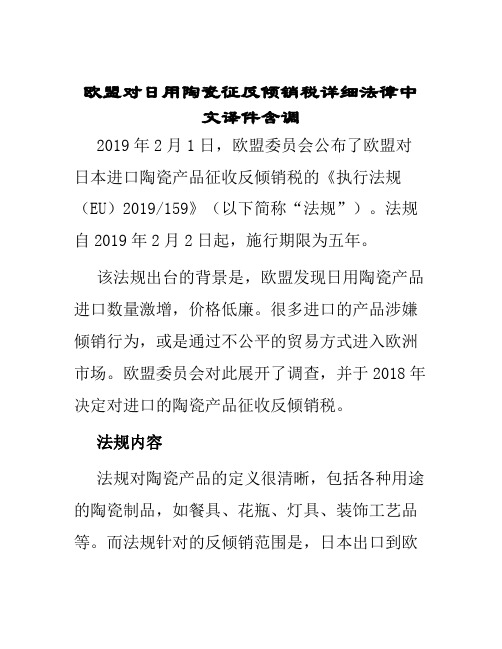
欧盟对日用陶瓷征反倾销税详细法律中文译件含调2019年2月1日,欧盟委员会公布了欧盟对日本进口陶瓷产品征收反倾销税的《执行法规(EU)2019/159》(以下简称“法规”)。
法规自2019年2月2日起,施行期限为五年。
该法规出台的背景是,欧盟发现日用陶瓷产品进口数量激增,价格低廉。
很多进口的产品涉嫌倾销行为,或是通过不公平的贸易方式进入欧洲市场。
欧盟委员会对此展开了调查,并于2018年决定对进口的陶瓷产品征收反倾销税。
法规内容法规对陶瓷产品的定义很清晰,包括各种用途的陶瓷制品,如餐具、花瓶、灯具、装饰工艺品等。
而法规针对的反倾销范围是,日本出口到欧洲市场的陶瓷制品,关税增值税(VAT)不包括在内。
法规规定,在欧洲市场销售的日本陶瓷产品必须遵守特定的价格承诺(Minimum Import Price,MIP)。
如果价格低于MIP,进口商需要向欧盟缴纳反倾销税。
进口商可以选择自行向欧盟缴纳税款,也可以通知买方,由买方向欧盟缴纳税款。
反倾销税的税率根据日本企业的不同情况而有所不同。
根据欧盟委员会的调查,日本的Lixil Group Corporation等一些企业存在倾销行为,因此会受到更高的税率。
法规实施过程如果进口商某批次的陶瓷产品低于MIP,应该立即通知欧盟。
欧盟委员会将发布通告,要求所有进口商停止销售低于MIP的产品,直到差价款项被缴纳。
为了确保进口商的缴款计算正确,欧盟将由专家委员会进行审核。
对于日本企业来说,如果被认定存在倾销行为,那么它们就需要缴纳反倾销税。
欧盟委员会每年都会对这些企业的情况进行评估,定期调整反倾销税率。
如果一些企业转移了其生产工厂到非日本国内,试图逃避反倾销税的制裁,欧盟委员会也会进行调查,并视情况重新对这些企业征税。
对陶瓷产品市场的影响欧盟这项法规出台后,对日本陶瓷制品出口带来巨大影响。
随着反倾销税的实施,进口商将更难从日本购买低价的陶瓷制品。
而对欧详市场重要的日本企业,也将面临着更高的税负。
美国、欧盟、日本反倾销法
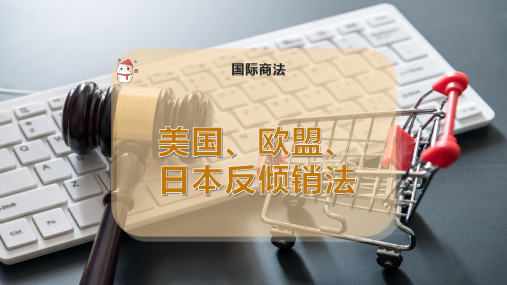
适当引入反倾销立法与实践的国家。只有在当征收反
倾销税是符合欧盟整体公共利益的情况下,才能征收
反倾销税。
(2)调查中计算倾销幅度同时,还计算损害幅度。
(3)欧盟在反倾销税计算和征收问题上执行的是
“税额从轻原则”,即以能否消除对国内工业的损害
为征税标准,足以消除倾销对国内工业造成的损害即
可。
(4)常使用价格承诺的方法来终止反倾销案件。
ITC) (3)国际贸易法院(Court of Interntional Trade,CIT) (4)海关具体负责征收反倾销税的工作 (5)联邦巡回上诉法院有权推翻美国贸易法院的裁决。
(Court Of Appeal for the Federal Circuit,CAFC)
3
2.美国反倾销法的特点
4
二、欧盟的反倾销法
1968年以前,当时的欧共体(EC)并没有一部统一的 反倾销法。1968年12月欧共体颁布了它的第一部统 一反倾销条例(459/68号条例)。其后,欧盟对其 反倾销法作过多次修改,欧盟现行的反倾销法是其 于1995年12月22日颁布的《抵制来自非欧共体成员 国的倾销进口产品条例》(简称欧盟1996年反倾销 条例)。
7
2.日本反倾销法特点
(1)考虑日本公共利益。 (2)采用联合调查与单独决定的做法。所有的反
倾销调查事项均由三个机构各自派出几个人共同 组成调查小组进行,但反倾销终裁权由大藏省单 独行使。 (3)反倾销行政自由裁量权大。日本法律未规定 对反倾销事务的司法审查程序,反倾销行政自由 裁置权较大。 (4)裁决内容的局限性。初步裁决和最终裁决的 内容也只能是肯定性裁决。
(1)在确定倾销与损害之间的因果关系上,美国目 前仍采取的是“最小原因原则”(minimal caused octrine)。 (2)在反倾销税征收标准上,美国目前实行的征收 原则仍显苛刻。 (3)美国仍然是目前实施反规避措施的主要国家之 一。所谓反规避措施是指为了有效地防止和限制出 口商以各种形式规避反倾销的行为的措施。 此外,美国至今仍然把中国视为非市场经济国家。
欧盟对华反倾销的原因
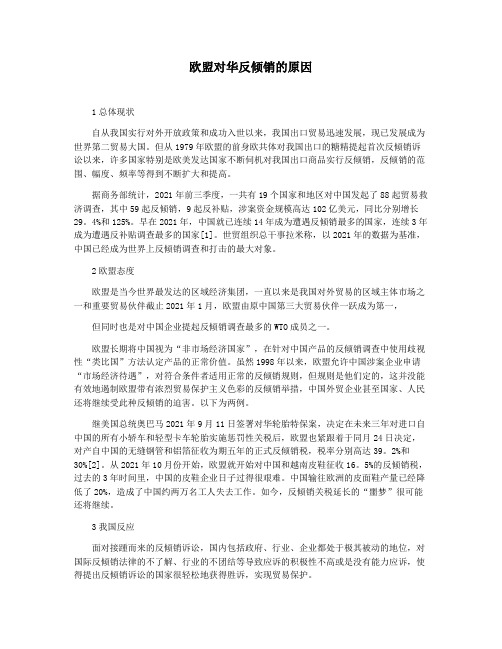
欧盟对华反倾销的原因1总体现状自从我国实行对外开放政策和成功入世以来,我国出口贸易迅速发展,现已发展成为世界第二贸易大国。
但从1979年欧盟的前身欧共体对我国出口的糖精提起首次反倾销诉讼以来,许多国家特别是欧美发达国家不断伺机对我国出口商品实行反倾销,反倾销的范围、幅度、频率等得到不断扩大和提高。
据商务部统计,2021年前三季度,一共有19个国家和地区对中国发起了88起贸易救济调查,其中59起反倾销,9起反补贴,涉案资金规模高达102亿美元,同比分别增长29。
4%和125%。
早在2021年,中国就已连续14年成为遭遇反倾销最多的国家,连续3年成为遭遇反补贴调查最多的国家[1]。
世贸组织总干事拉米称,以2021年的数据为基准,中国已经成为世界上反倾销调查和打击的最大对象。
2欧盟态度欧盟是当今世界最发达的区域经济集团,一直以来是我国对外贸易的区域主体市场之一和重要贸易伙伴截止2021年1月,欧盟由原中国第三大贸易伙伴一跃成为第一,但同时也是对中国企业提起反倾销调查最多的WTO成员之一。
欧盟长期将中国视为“非市场经济国家”,在针对中国产品的反倾销调查中使用歧视性“类比国”方法认定产品的正常价值。
虽然1998年以来,欧盟允许中国涉案企业申请“市场经济待遇”,对符合条件者适用正常的反倾销规则,但规则是他们定的,这并没能有效地遏制欧盟带有浓烈贸易保护主义色彩的反倾销举措,中国外贸企业甚至国家、人民还将继续受此种反倾销的迫害。
以下为两例。
继美国总统奥巴马2021年9月11日签署对华轮胎特保案,决定在未来三年对进口自中国的所有小轿车和轻型卡车轮胎实施惩罚性关税后,欧盟也紧跟着于同月24日决定,对产自中国的无缝钢管和铝箔征收为期五年的正式反倾销税,税率分别高达39。
2%和30%[2]。
从2021年10月份开始,欧盟就开始对中国和越南皮鞋征收16。
5%的反倾销税,过去的3年时间里,中国的皮鞋企业日子过得很艰难。
中国输往欧洲的皮面鞋产量已经降低了20%,造成了中国约两万名工人失去工作。
最新欧盟反倾销规则

COUNCIL REGULATION (EC) No 1225/2009of 30 November 2009on protection against dumped imports from countries not members of the European Community(codified version)THE COUNCIL OF THE EUROPEAN UNION,Having regard to the Treaty establishing the European Community, and in particular Article 133 thereof,Having regard to Council Regulation (EC) No 1234/2007 of 22 October 2007 establishing a common organisation of agricultural markets and on specific provisions for certain agricultural products (Single CMO Regulation)(1) OJ L 299, 16.11.2007, p. 1. (1),Having regard to the proposal from the Commission,Whereas:(1)Council Regulation (EC) No 384/96 of 22 December 1995 on protection against dumped imports from countries not members of the European Community (2) OJ L 56, 6.3.1996, p. 1. (2), has been substantially amended several times (3) See Annex I.(3). In the interests of clarity and rationality the said Regulation should be codified.(2)The multilateral trade negotiations concluded in 1994 led to new Agreements on the implementation of Article VI of the General Agreement on Tariffs and Trade (hereinafter referred to as ‘GATT’). In the light of the different nature of the new rules for dumping and subsidies respectively, it is also appropriate to have a separate body of Community rules in each of those two areas. Consequently, the rules on protection against subsidies and countervailing duties are contained in a separate Regulation.(3)The agreement on dumping, namely, the Agreement on Implementation of Article VI of the General Agreement on Tariffs and Trade 1994 (hereinafter referred to as ‘the 1994 Anti-Dumping Agreement’), contains detailed rules, relating in particular to the calculation of dumping, procedures for initiating and pursuing an investigation, including the establishment and treatment of the facts, the imposition of provisional measures, the imposition and collection of anti-dumping duties, the duration and review of anti-dumping measures and the public disclosure of information relating to anti-dumping investigations. In order to ensure a proper and transparent application of those rules, the language of the agreement should be brought into Community legislation as far as possible.(4)In applying the rules it is essential, in order to maintain the balance of rights and obligations which the GATT Agreement establishes, that the Community take account of how they are interpreted by the Community’s major trading partners.(5)It is desirable to lay down clear and detailed rules on the calculation of normal value. In particular such value should in all cases be based on representative sales in the ordinary course of trade in the exporting country. It is expedient to give guidance as to when parties may be considered as being associated for the purpose of determining dumping. It is expedient to define the circumstances in which domestic sales may be considered to be made at a loss and may be disregarded, and in which recourse may be had to remaining sales, or to constructed normal value, or to sales to a third country. It is also appropriate to provide for a proper allocation of costs, even in start-up situations, and to lay down guidance as to the definition of start-up and the extent and method of allocation. It is also necessary, when constructing normal value, to indicate the methodology to be applied in determining the amounts for selling, general and administrative costs and the profit margin that should be included in such value.(6)When determining normal value for non-market economy countries, it appears prudent to set out rules for choosing the appropriate market-economy third country to be used for such purpose and, where it is not possible to find a suitable third country, to provide that normal value may be established on any other reasonable basis.(7)It is appropriate for the Community’s anti-dumping practice to take account of the changed economic conditions in Kazakhstan. In particular, it is appropriate to specify that normal value may be determined in accordance with the rules applicable to market economy countries in cases where it can be shown that market conditions prevail for one or more producers, subject to investigation in relation to the manufacture and sale of the product concerned.(8)It is also appropriate to grant similar treatment to imports from such countries which are members of the World Trade Organisation (WTO) at the date of the initiation of the relevant anti-dumping investigation.(9) It is appropriate to specify that an examination of whethermarket conditions prevail will be carried out on the basisof properly substantiated claims by one or more producers subject to investigation who wish to avail themselves ofthe possibility to have normal value determined on thebasis of rules applicable to market economy countries.(10) It is expedient to define the export price and to enumeratethe adjustments which are to be made in those cases wherea reconstruction of this price from the first open-marketprice is deemed necessary.(11) For the purpose of ensuring a fair comparison betweenexport price and normal value, it is advisable to list the factors which may affect prices and price comparability andto lay down specific rules as to when and how the adjustments should be made, including the fact that any duplication of adjustments should be avoided. It is also necessaryto provide that comparison may be made using averageprices although individual export prices may be comparedto an average normal value where the former vary by customer, region or time period.(12) It is necessary to lay down clear and detailed guidance asto the factors which may be relevant for the determinationof whether the dumped imports have caused materialinjury or are threatening to cause injury. In demonstratingthat the volume and price levels of the imports concernedare responsible for injury sustained by a Community industry, attention should be given to the effect of other factorsand in particular prevailing market conditions in theCommunity.(13) It is advisable to define the term ‘Community industry’ andto provide that parties related to exporters may be excludedfrom such industry, and to define the term ‘related’. It isalso necessary to provide for anti-dumping action to betaken on behalf of producers in a region of the Community and to lay down guidelines on the definition of suchregion.(14) It is necessary to lay down who may lodge an anti-dumpingcomplaint, including the extent to which it should be supported by the Community industry, and the informationon dumping, injury and causation which such complaintshould contain. It is also expedient to specify the procedures for the rejection of complaints or the initiation ofproceedings.(15) It is necessary to lay down the manner in which interestedparties should be given notice of the information whichthe authorities require, and should have ample opportunityto present all relevant evidence and to defend their interests. It is also desirable to set out clearly the rules and procedures to be followed during the investigation, inparticular the rules whereby interested parties are to makethemselves known, present their views and submit information within specified time-limits, if such views andinformation are to be taken into account. It is also appropriate to set out the conditions under which an interestedparty may have access to, and comment on, informationpresented by other interested parties. There should also becooperation between the Member States and the Commission in the collection of information.(16) It is necessary to lay down the conditions under which provisional duties may be imposed, including the conditionthat they may be imposed no earlier than 60 days from initiation and no later than nine months thereafter. Foradministrative reasons, it is also necessary to provide thatsuch duties may in all cases be imposed by the Commission, either directly for a nine-month period or in twostages of six and three months.(17) It is necessary to specify procedures for accepting undertakings which eliminate dumping and injury instead ofimposing provisional or definitive duties. It is also appropriate to lay down the consequences of breach or withdrawal of undertakings and that provisional duties may beimposed in cases of suspected violation or where furtherinvestigation is necessary to supplement the findings. Inaccepting undertakings, care should be taken that the proposed undertakings, and their enforcement, do not lead toanti-competitive behaviour.(18) It is necessary to provide that the termination of casesshould, irrespective of whether definitive measures areadopted or not, normally take place within 12 months,and in no case later than 15 months, from the initiation ofthe investigation. Investigations or proceedings should beterminated where the dumping is de minimis or the injuryis negligible, and it is appropriate to define those terms.Where measures are to be imposed, it is necessary to provide for the termination of investigations and to lay downthat measures should be less than the margin of dumpingif such lesser amount would remove the injury, as well asto specify the method of calculating the level of measuresin cases of sampling.(19) It is necessary to provide for retroactive collection of provisional duties if that is deemed appropriate and to definethe circumstances which may trigger the retroactive application of duties to avoid the undermining of the definitivemeasures to be applied. It is also necessary to provide thatduties may be applied retroactively in cases of breach orwithdrawal of undertakings.(20) It is necessary to provide that measures are to lapse afterfive years unless a review indicates that they should bemaintained. It is also necessary to provide, in cases wheresufficient evidence is submitted of changed circumstances,for interim reviews or for investigations to determinewhether refunds of anti-dumping duties are warranted. Itis also appropriate to lay down that in any recalculation ofdumping which necessitates a reconstruction of exportprices, duties are not to be treated as a cost incurredbetween importation and resale where the said duty isbeing reflected in the prices of the products subject to measures in the Community.(21) It is necessary to provide specifically for the reassessmentof export prices and dumping margins where the duty isbeing absorbed by the exporter through a form of compensatory arrangement and the measures are not beingreflected in the prices of the products subject to measuresin the Community.(22) The 1994 Anti-Dumping Agreement does not containprovisions regarding the circumvention of anti-dumpingmeasures, though a separate GATT Ministerial Decisionrecognises circumvention as a problem and has referred itto the GATT Anti-dumping Committee for resolution.Given the failure of the multilateral negotiations so far andpending the outcome of the referral to the WTO Anti-Dumping Committee, it is necessary that Community legislation should contain provisions to deal with practices,including mere assembly of goods in the Community or athird country, which have as their main aim the circumvention of anti-dumping measures.(23) It is also desirable to clarify which practices constitute circumvention of the measures in place. Circumvention practices may take place either inside or outside theCommunity. It is consequently necessary to provide thatexemptions from the extended duties which may alreadybe granted to importers may also be granted to exporterswhen duties are being extended to address circumventiontaking place outside the Community.(24) It is expedient to permit suspension of anti-dumping measures where there is a temporary change in market conditions which makes the continued imposition of suchmeasures temporarily inappropriate.(25) It is necessary to provide that imports under investigationmay be made subject to registration upon importation inorder to enable measures to be applied subsequentlyagainst such imports.(26) In order to ensure proper enforcement of measures, it isnecessary that Member States monitor, and report to theCommission, the import trade of products subject to investigation or subject to measures, and also the amount ofduties collected under this Regulation.(27) It is necessary to provide for consultation of an AdvisoryCommittee at regular and specified stages of the investigation. The Committee should consist of representatives ofMember States with a representative of the Commission aschairman.(28) Information provided to Member States in the AdvisoryCommittee is often of a highly technical nature andinvolves an elaborate economic and legal analysis. In orderto provide Member States with sufficient time to considerthis information, it should be sent at an appropriate timebefore the date of a meeting set by the Chairman of theAdvisory Committee.(29) It is expedient to provide for verification visits to checkinformation submitted on dumping and injury, such visitsbeing, however, conditional on proper replies to questionnaires being received.(30) It is essential to provide for sampling in cases where thenumber of parties or transactions is large in order to permit completion of investigations within the appointedtime-limits.(31) It is necessary to provide that where parties do not cooperate satisfactorily other information may be used to establish findings and that such information may be lessfavourable to the parties than if they had cooperated.(32) Provision should be made for the treatment of confidential information so that business secrets are not divulged.(33) It is essential that provision be made for proper disclosureof essential facts and considerations to parties whichqualify for such treatment and that such disclosure bemade, with due regard to the decision-making process inthe Community, within a time-limit which permits partiesto defend their interests.(34) It is prudent to provide for an administrative system underwhich arguments can be presented as to whether measuresare in the Community interest, including the consumers’interest, and to lay down the time-limits within which suchinformation has to be presented as well as the disclosurerights of the parties concerned,HAS ADOPTED THIS REGULATION:Article 1Principles1. An anti-dumping duty may be applied to any dumped product whose release for free circulation in the Community causes injury.2. A product is to be considered as being dumped if its export price to the Community is less than a comparable price for the like product, in the ordinary course of trade, as established for the exporting country.3. The exporting country shall normally be the country of origin. However, it may be an intermediate country, except where, for example, the products are merely transhipped through that country, or the products concerned are not produced in that country, or there is no comparable price for them in that country.4. For the purpose of this Regulation, ‘like product’ means a product which is identical, that is to say, alike in all respects, to the product under consideration, or in the absence of such a product, another product which, although not alike in all respects, has characteristics closely resembling those of the product under consideration.Article 2Determination of dumpingA. N ORMAL VALUE1. The normal value shall normally be based on the prices paid or payable, in the ordinary course of trade, by independent customers in the exporting country.However, where the exporter in the exporting country does not produce or does not sell the like product, the normal value may be established on the basis of prices of other sellers or producers. Prices between parties which appear to be associated or to have a compensatory arrangement with each other may not be considered to be in the ordinary course of trade and may not be used to establish normal value unless it is determined that they are unaffected by the relationship.In order to determine whether two parties are associated account may be taken of the definition of related parties set out in Article 143 of Commission Regulation (EEC) No 2454/93 of 2 July 1993 laying down provisions for the implementation of Council Regulation (EEC) No 2913/92 establishing the Community Customs Code (1) OJ L 253, 11.10.1993, p. 1.(1).2. Sales of the like product intended for domestic consumption shall normally be used to determine normal value if such sales volume constitutes 5 % or more of the sales volume of the product under consideration to the Community. However, a lower volume of sales may be used when, for example, the prices charged are considered representative for the market concerned.3. When there are no or insufficient sales of the like product in the ordinary course of trade, or where because of the particularmarket situation such sales do not permit a proper comparison, the normal value of the like product shall be calculated on the basis of the cost of production in the country of origin plus a reasonable amount for selling, general and administrative costs and for profits, or on the basis of the export prices, in the ordinary course of trade, to an appropriate third country, provided that those prices are representative.A particular market situation for the product concerned within the meaning of the first subparagraph may be deemed to exist, inter alia, when prices are artificially low, when there is significant barter trade, or when there are non-commercial processing arrangements.4. Sales of the like product in the domestic market of the exporting country, or export sales to a third country, at prices below unit production costs (fixed and variable) plus selling, general and administrative costs may be treated as not being in the ordinary course of trade by reason of price, and may be disregarded in determining normal value, only if it is determined that such sales are made within an extended period in substantial quantities, and are at prices which do not provide for the recovery of all costs within a reasonable period of time.If prices which are below costs at the time of sale are above weighted average costs for the period of investigation, such prices shall be considered to provide for recovery of costs within a reasonable period of time.The extended period of time shall normally be one year but shall in no case be less than six months, and sales below unit cost shall be considered to be made in substantial quantities within such a period when it is established that the weighted average selling price is below the weighted average unit cost, or that the volume of sales below unit cost is not less than 20 % of sales being used to determine normal value.5. Costs shall normally be calculated on the basis of records kept by the party under investigation, provided that such records are in accordance with the generally accepted accounting principles of the country concerned and that it is shown that the records reasonably reflect the costs associated with the production and sale of the product under consideration.If costs associated with the production and sale of the product under investigation are not reasonably reflected in the records of the party concerned, they shall be adjusted or established on the basis of the costs of other producers or exporters in the same country or, where such information is not available or cannot be used, on any other reasonable basis, including information from other representative markets.Consideration shall be given to evidence submitted on the proper allocation of costs, provided that it is shown that such allocations have been historically utilised. In the absence of a more appropriate method, preference shall be given to the allocation of costs on the basis of turnover. Unless already reflected in the cost allocations under this subparagraph, costs shall be adjusted appropriately for those non-recurring items of cost which benefit future and/or current production.Where the costs for part of the period for cost recovery are affected by the use of new production facilities requiring substantial additional investment and by low capacity utilisation rates, which are the result of start-up operations which take place within or during part of the investigation period, the average costs for the start-up phase shall be those applicable, under the abovementioned allocation rules, at the end of such a phase, and shall be included at that level, for the period concerned, in the weighted average costs referred to in the second subparagraph of paragraph 4. The length of a start-up phase shall be determined in relation to the circumstances of the producer or exporter concerned, but shall not exceed an appropriate initial portion of the period for cost recovery. For this adjustment to costs applicable during the investigation period, information relating to a start-up phase which extends beyond that period shall be taken into account where it is submitted prior to verification visits and within three months of the initiation of the investigation. 6. The amounts for selling, for general and administrative costs and for profits shall be based on actual data pertaining to production and sales, in the ordinary course of trade, of the like product, by the exporter or producer under investigation. When such amounts cannot be determined on this basis, the amounts may be determined on the basis of:(a) the weighted average of the actual amounts determined forother exporters or producers subject to investigation in respect of production and sales of the like product in the domestic market of the country of origin;(b) the actual amounts applicable to production and sales, in theordinary course of trade, of the same general category of products for the exporter or producer in question in the domestic market of the country of origin;(c) any other reasonable method, provided that the amount forprofit so established shall not exceed the profit normally realised by other exporters or producers on sales of products of the same general category in the domestic market of the country of origin.7. (a)In the case of imports from non-market economy countries (1) Including Azerbaijan, Belarus, North Korea, Tajikistan, Turkmenistan and Uzbekistan.(1), normal value shall be determined on the basis of the price or constructed value in a market economy third country, or the price from such a third country to other countries, including the Community, or where those are not possible, on any other reasonable basis, including the price actually paid or payable in the Community for the like product, duly adjusted if necessary to include a reasonable profit margin.An appropriate market economy third country shall be selected in a not unreasonable manner, due account being taken of any reliable information made available at the time of selection. Account shall also be taken of time-limits; where appropriate, a market economy third country which is subject to the same investigation shall be used.The parties to the investigation shall be informed shortly after its initiation of the market economy third country envisaged and shall be given 10 days to comment.(b)In anti-dumping investigations concerning imports from Kazakhstan and any non-market-economy country which is a member of the WTO at the date of the initiation of the investigation, normal value shall be determined in accordance with paragraphs 1 to 6, if it is shown, on the basis of properly substantiated claims by one or more producers subject to the investigation and in accordance with the criteria and procedures set out in subparagraph (c), that market economy conditions prevail for this producer or producers in respect of the manufacture and sale of the like product concerned. When this is not the case, the rules set out under subparagraph (a) shall apply.(c)A claim under subparagraph (b) must be made in writing and contain sufficient evidence that the producer operates under market economy conditions, that is if:—decisions of firms regarding prices, costs and inputs,including for instance raw materials, cost of technology and labour, output, sales and investment, are made in response to market signals reflecting supply and demand, and without significant State interference in this regard, and costs of major inputs substantially reflect market values,—firms have one clear set of basic accounting recordswhich are independently audited in line with international accounting standards and are applied for all purposes,—the production costs and financial situation of firms arenot subject to significant distortions carried over from the former non-market economy system, in particular in relation to depreciation of assets, other write-offs, barter trade and payment via compensation of debts,—the firms concerned are subject to bankruptcy andproperty laws which guarantee legal certainty and stability for the operation of firms, and—exchange rate conversions are carried out at the market rate.A determination whether the producer meets the abovementioned criteria shall be made within three months of the initiation of the investigation, after specific consultation of the Advisory Committee and after the Community industry has been given an opportunity to comment. This determination shall remain in force throughout the investigation.B. E XPORT PRICE8. The export price shall be the price actually paid or payable for the product when sold for export from the exporting country to the Community.9. In cases where there is no export price or where it appears that the export price is unreliable because of an association or a compensatory arrangement between the exporter and the importer or a third party, the export price may be constructed on the basis of the price at which the imported products are first resold to an independent buyer, or, if the products are not resold to an independent buyer, or are not resold in the condition in which they were imported, on any reasonable basis.In these cases, adjustment for all costs, including duties and taxes, incurred between importation and resale, and for profits accruing, shall be made so as to establish a reliable export price, at the Community frontier level.The items for which adjustment shall be made shall include those normally borne by an importer but paid by any party, either inside or outside the Community, which appears to be associated or to have a compensatory arrangement with the importer or exporter, including usual transport, insurance, handling, loading and ancillary costs; customs duties, any anti-dumping duties, and other taxes payable in the importing country by reason of the importation or sale of the goods; and a reasonable margin for selling, general and administrative costs and profit.C. C OMPARISON10. A fair comparison shall be made between the export price and the normal value. This comparison shall be made at the same level of trade and in respect of sales made at, as closely as possible, the same time and with due account taken of other differences which affect price comparability. Where the normal value and the export price as established are not on such a comparable basis due allowance, in the form of adjustments, shall be made in each case, on its merits, for differences in factors which are claimed, and demonstrated, to affect prices and price comparability. Any duplication when making adjustments shall be avoided, in particular in relation to discounts, rebates, quantities and level of trade. When the specified conditions are met, the factors for which adjustment can be made are listed as follows:(a) Physical characteristicsAn adjustment shall be made for differences in the physical characteristics of the product concerned. The amount of the adjustment shall correspond to a reasonable estimate of the market value of the difference.(b) Import charges and indirect taxesAn adjustment shall be made to normal value for an amount corresponding to any import charges or indirect taxes borne by the like product and by materials physically incorporated therein, when intended for consumption in the exporting country and not collected or refunded in respect of the product exported to the Community.(c) Discounts, rebates and quantitiesAn adjustment shall be made for differences in discounts and rebates, including those given for differences in quantities, if these are properly quantified and are directly linked to the sales under consideration. An adjustment may also be made for deferred discounts and rebates if the claim is based on consistent practice in prior periods, including compliance with the conditions required to qualify for the discount or rebates.(d) Level of trade(i) An adjustment for differences in levels of trade, including any differences which may arise in OEM (OriginalEquipment Manufacturer) sales, shall be made where, inrelation to the distribution chain in both markets, it isshown that the export price, including a constructedexport price, is at a different level of trade from the normal value and the difference has affected price comparability which is demonstrated by consistent and distinctdifferences in functions and prices of the seller for thedifferent levels of trade in the domestic market of theexporting country. The amount of the adjustment shallbe based on the market value of the difference.(ii) However, in circumstances not envisaged under point (i), when an existing difference in level of trade cannot bequantified because of the absence of the relevant levelson the domestic market of the exporting countries, orwhere certain functions are shown clearly to relate tolevels of trade other than the one which is to be used inthe comparison, a special adjustment may be granted.(e) Transport, insurance, handling, loading and ancillary costsAn adjustment shall be made for differences in the directly related costs incurred for conveying the product concerned from the premises of the exporter to an independent buyer, where such costs are included in the prices charged. Those costs shall include transport, insurance, handling, loading and ancillary costs.(f) PackingAn adjustment shall be made for differences in the directly related packing costs for the product concerned.。
欧盟反倾销之道

欧盟 反倾 铺 充分利 用 自由藏■权
施须符 合 欧盟 的整体 利益 。 映在反倾 销制 度 中 . 反 欧盟 规定
即使倾 销成 立 . 并给 欧盟工 业造 成实 质损 害 , 必须 符合 欧 还
由 于反倾销调查中对于一些标准的确立和事实的认定. J 盟整体千益 《 包括综合考虑起诉厂商、 消费者、 进口商三方
维普资讯
中国 是 被欧 盟 反倾 鞘 起 诉 最 多的 国 家。欧 盟 用 自己 手中的 “ 市场 经 济标 准 ” 自由 裁 量 中 国涉 案 企 业, 能 通
过标 准 认定 的 企业 非 常少 。
●
r
Байду номын сангаас
WT O任 亘扬 贸易 白日 、 开全碱 化 的同时 经 乜 反 不公 互 贸 易竞争 . 主要体现 在世 贸组 这 纸 允许 萁成 员唇 实施反 倾销 和反 、 =随 着世 贸 贴 组织 成 员 国间关 税 逐 步降 j 关税 壁垒 尤奠 匠 : 是 配额 、谆 可 证等 限 进 口措施 的禁止使 用 上
欧盟 的反倾 销 法律 框架
欧盟 反倾 销法 譬 的形成 终 l , 一个 发展 、完 善 的 渐进 迂 程 致盟 的反 倾 销 法 律体 系来 源 1 5 年 1 1日生 效 的 《 马 器约 的原 则规 8 9 月 为 实现欧共 仁的 统 关税 同盟 9 8 欧 共体颁 5年
反 倾销 案 中 有 4 起是 以藕 国企业 构价捂 承 诺结 秦 无 结 案 日诉 万斑 诉 、曰不 符合 致监 共司 其余素 , 斗均强 征 反
干 益撺 诉 案 件杀 有2 起 L 4
倾 销税 目 产 品被 排挤 出欧 骂 肓场 。 关
述手 段逐 步演 为世界 各 里最 遍 哭 的 贸易保 护手 段 来 其 由反倾销 又 是各 国运 用最 多的 i E年 失业军 上升 贸
出口遭遇欧盟反倾销的原因分析和对策建议

出口遭遇欧盟反倾销的原因分析和对策建议随着全球化进程的不断深化,贸易往来也愈加频繁。
对于一个出口大国来说,遭遇反倾销调查是十分常见的事情。
而最近,欧盟开始对一些国家的出口商品展开反倾销调查。
本文将分析导致这一现象出现的原因,并提出相应的对策建议。
一、出口遭遇欧盟反倾销的原因分析(一)市场扭曲市场扭曲是出口遭遇反倾销调查的主要因素之一。
经过多年的监管和调控,欧盟的市场已逐渐形成了一个相对稳定的体系。
但是,来自其他国家的低价、低质量、过剩产能的商品却给欧盟市场带来了冲击。
这一方面是来自新兴市场经济体的产品价格竞争,另一方面也与欧盟市场扭曲本身有关。
(二)贸易保护主义贸易保护主义是导致出口遭遇反倾销调查的另一个重要原因。
国家在贸易市场上必然会受到其他国家的冲击,但是为了保护本国产业和市场,很多国家倾向于对其它国家的商品施加限制或者实行反倾销政策,这也是欧盟采取反倾销调查的主要原因之一。
(三)技术创新和高端制造缺失现代制造业技术水平高,要想进军国际市场、跻身于世界制造强国行列,必须具备技术创新能力和高端制造能力。
但是一些出口国家由于本身技术水平较低,所以在经营贸易时往往是低技术含量、低附加值的产品,这也使欧盟国家采取反倾销政策的可能性增加。
二、对策建议(一)提高技术含量和附加值为了避免遭遇反倾销,出口国家需要提高产品的技术含量和附加值。
只有这样才能在国际市场上立足。
为此,出口国家需要鼓励技术创新、提高研发经费、加强人才引进和培训等方面的投入。
(二)掌握市场情况,防范风险出口国家需要了解目标市场的法规、贸易壁垒、产业政策等情况,切实防范风险。
同时,在出口贸易合同中要严格约定合同条款,防止出现因合同条款不规范或漏洞而导致欧盟反倾销调查。
(三)积极应对欧盟反倾销调查如果遭遇欧盟反倾销调查,出口国家不能消沉自闭,而是应该积极应对。
首先,要尊重欧盟的反倾销决定,对于自身的问题要实事求是、严肃治理。
同时,出口国家也要通过多边机制或者通过调节谈判来维护其在欧盟市场的出口利益。
【5A文】欧盟反倾销调查程序简介
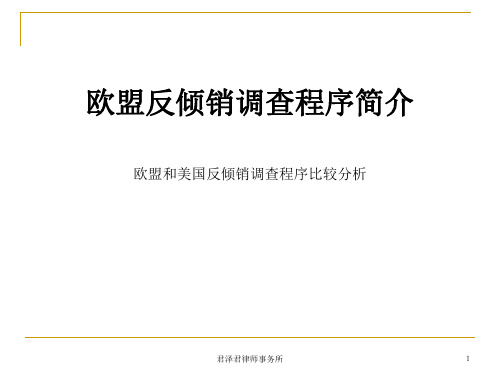
君泽君律师事务所
18
单独待遇和分别税率的区别
贸易商, 比如非生产商, 不可以主张单独待遇, 但可以主张分别税率. 企业的国有性质,通过国有贸易公司出口, 有 企业设定最低价格或者其他在国内和出口市场 上的限制,在主张单独待遇时是很大的问题, 但在主张分别税率时却不是问题. 因此单独待遇要比分别税率更难主张成功.
君泽君律师事务所
13
单独待遇 (IT)
不符合市场经济地位要求的企业可以申请单独 待遇,与美国的分别税率相类似. 单独待遇就意味着以单个企业具体的出口价格 为基础来计算企业单独的关税.这样计算出来 的单独关税要低于没有获得市场经济地位或者 单独待遇的企业所得到的一般税率.
君泽君律师事务所
14
分别税率的标准
君泽君律师事务所
16
单独待遇标准
1. 2. 3.
收回资产和利润的自由 (仅对外商投资企业); 自主决定出口价格以及数量和其他交易条款; 以市场价格确定汇率;
君泽君律师事务所
17
பைடு நூலகம்
单独待遇标准 (2)
4.
5.
股份的大部分由私人持有.政府人员在董事 会或者其他重要管理岗位上所占的比例要非 常的小,或者可以证明公司很大程度上不受 政府的干预.并且 政府的干预不至于导致对所采取措施的规 避.
3.
MET确定标准
生产成本和财务状况不受前非市场经济体系的影 响,尤其是关于资产的折旧,注销,易货交易以 及债务补偿; 适用破产法和财产法; 并且 汇率以市场价格确定.
4. 5.
君泽君律师事务所
11
MOI与MET的区别
MOI是针对整个行业来讲,而MET 是针对单 独的出口商. 要求相关联企业的合作,但并 不要求行业内其他出口商的合作. MOI 要调查向被调查企业提供投入要素的整个 行业. MET 只调查每个企业和向其提供投入要 素的企业间的直接关系来决定是否存在市场要 素.
欧盟双反_精品文档
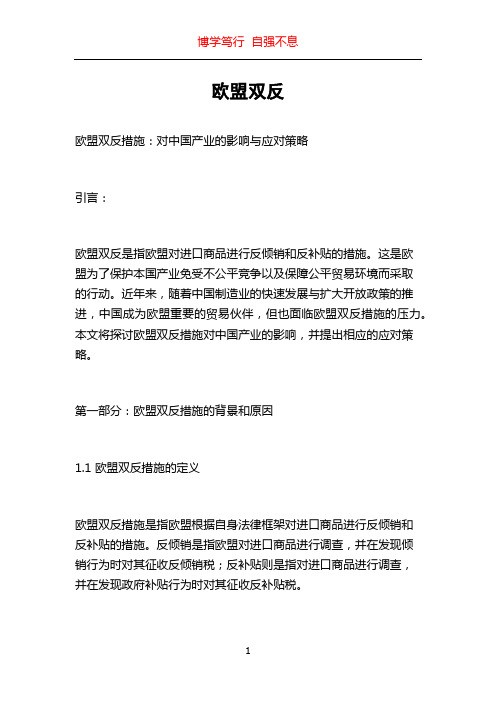
欧盟双反欧盟双反措施:对中国产业的影响与应对策略引言:欧盟双反是指欧盟对进口商品进行反倾销和反补贴的措施。
这是欧盟为了保护本国产业免受不公平竞争以及保障公平贸易环境而采取的行动。
近年来,随着中国制造业的快速发展与扩大开放政策的推进,中国成为欧盟重要的贸易伙伴,但也面临欧盟双反措施的压力。
本文将探讨欧盟双反措施对中国产业的影响,并提出相应的应对策略。
第一部分:欧盟双反措施的背景和原因1.1 欧盟双反措施的定义欧盟双反措施是指欧盟根据自身法律框架对进口商品进行反倾销和反补贴的措施。
反倾销是指欧盟对进口商品进行调查,并在发现倾销行为时对其征收反倾销税;反补贴则是指对进口商品进行调查,并在发现政府补贴行为时对其征收反补贴税。
1.2 欧盟双反措施的原因欧盟双反措施的实施是为了维护欧洲企业的利益和国际贸易的公平。
欧盟认为,一些国家或地区的企业通过倾销和补贴行为,使得其产品在欧盟市场上具有价格竞争力,对本国产业造成不公平竞争。
因此,欧盟决定采取双反措施,以保护本国产业的利益。
第二部分:欧盟双反措施对中国产业的影响2.1 对中国出口商品的影响欧盟双反措施对中国出口商品产生了直接的影响。
由于欧盟征收了反倾销税和反补贴税,这使得中国出口商品的成本上升,竞争力下降。
许多中国企业面临出口困难和订单减少的问题,对中国整体外贸形势产生了压力。
2.2 对中国产业的影响欧盟双反措施对中国产业也带来了一定的冲击。
双反措施导致中国相关产业面临竞争压力和市场份额下降的风险。
特别是那些依赖欧盟市场的行业,如钢铁、太阳能等,更是受到了较大的影响。
第三部分:应对欧盟双反的策略3.1 多元化市场布局面对欧盟双反的压力,中国企业可以通过多元化市场布局来减少风险。
不依赖单一市场,而是积极开拓其他市场,降低对欧盟市场的依赖程度。
中国一带一路倡议为中国企业拓展市场提供了新机遇,应积极利用。
3.2 提升产品附加值和质量提升产品附加值和质量是增强竞争力的重要举措。
欧盟反倾销法实践与应对反倾销的法律策略
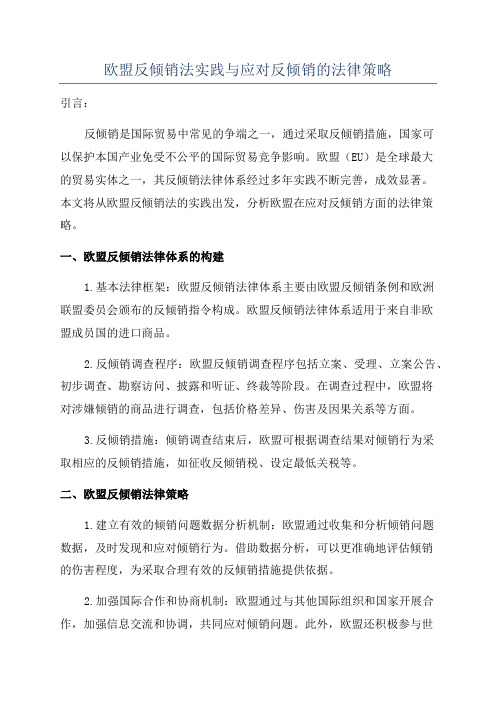
欧盟反倾销法实践与应对反倾销的法律策略引言:反倾销是国际贸易中常见的争端之一,通过采取反倾销措施,国家可以保护本国产业免受不公平的国际贸易竞争影响。
欧盟(EU)是全球最大的贸易实体之一,其反倾销法律体系经过多年实践不断完善,成效显著。
本文将从欧盟反倾销法的实践出发,分析欧盟在应对反倾销方面的法律策略。
一、欧盟反倾销法律体系的构建1.基本法律框架:欧盟反倾销法律体系主要由欧盟反倾销条例和欧洲联盟委员会颁布的反倾销指令构成。
欧盟反倾销法律体系适用于来自非欧盟成员国的进口商品。
2.反倾销调查程序:欧盟反倾销调查程序包括立案、受理、立案公告、初步调查、勘察访问、披露和听证、终裁等阶段。
在调查过程中,欧盟将对涉嫌倾销的商品进行调查,包括价格差异、伤害及因果关系等方面。
3.反倾销措施:倾销调查结束后,欧盟可根据调查结果对倾销行为采取相应的反倾销措施,如征收反倾销税、设定最低关税等。
二、欧盟反倾销法律策略1.建立有效的倾销问题数据分析机制:欧盟通过收集和分析倾销问题数据,及时发现和应对倾销行为。
借助数据分析,可以更准确地评估倾销的伤害程度,为采取合理有效的反倾销措施提供依据。
2.加强国际合作和协商机制:欧盟通过与其他国际组织和国家开展合作,加强信息交流和协调,共同应对倾销问题。
此外,欧盟还积极参与世界贸易组织(WTO)的倾销问题谈判,推动国际倾销规则的完善,为自身利益争取更多保障。
3.根据国际经济形势灵活调整反倾销政策:欧盟在实践中根据国际经济形势的变化,不断调整反倾销政策。
例如,2024年,面对全球钢铁产能过剩和严重扭曲的市场竞争,欧盟推出了一个新的钢铁反倾销工具,以更好地应对倾销问题。
4.支持产业结构调整和创新发展:欧盟通过支持产业结构调整和创新发展,提升本国产业的竞争力,并减少其对外倾销的依赖。
在相应领域,欧盟鼓励产业通过创新、提高附加值和服务质量等方式,提高其产品的竞争力。
5.建立有效的争端解决机制:欧盟建立了一个有效的争端解决机制,用于处理反倾销争端。
欧盟反倾销法律程序简介及其应对策略
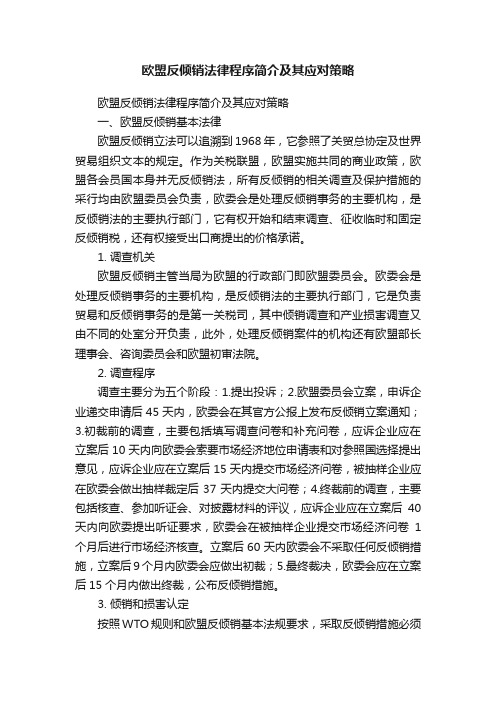
欧盟反倾销法律程序简介及其应对策略欧盟反倾销法律程序简介及其应对策略一、欧盟反倾销基本法律欧盟反倾销立法可以追溯到1968年,它参照了关贸总协定及世界贸易组织文本的规定。
作为关税联盟,欧盟实施共同的商业政策,欧盟各会员国本身并无反倾销法,所有反倾销的相关调查及保护措施的采行均由欧盟委员会负责,欧委会是处理反倾销事务的主要机构,是反倾销法的主要执行部门,它有权开始和结束调查、征收临时和固定反倾销税,还有权接受出口商提出的价格承诺。
1. 调查机关欧盟反倾销主管当局为欧盟的行政部门即欧盟委员会。
欧委会是处理反倾销事务的主要机构,是反倾销法的主要执行部门,它是负责贸易和反倾销事务的是第一关税司,其中倾销调查和产业损害调查又由不同的处室分开负责,此外,处理反倾销案件的机构还有欧盟部长理事会、咨询委员会和欧盟初审法院。
2. 调查程序调查主要分为五个阶段:1.提出投诉;2.欧盟委员会立案,申诉企业递交申请后45天内,欧委会在其官方公报上发布反倾销立案通知;3.初裁前的调查,主要包括填写调查问卷和补充问卷,应诉企业应在立案后10天内向欧委会索要市场经济地位申请表和对参照国选择提出意见,应诉企业应在立案后15天内提交市场经济问卷,被抽样企业应在欧委会做出抽样裁定后37天内提交大问卷;4.终裁前的调查,主要包括核查、参加听证会、对披露材料的评议,应诉企业应在立案后40天内向欧委提出听证要求,欧委会在被抽样企业提交市场经济问卷1个月后进行市场经济核查。
立案后60天内欧委会不采取任何反倾销措施,立案后9个月内欧委会应做出初裁;5.最终裁决,欧委会应在立案后15个月内做出终裁,公布反倾销措施。
3. 倾销和损害认定按照WTO规则和欧盟反倾销基本法规要求,采取反倾销措施必须满足三个要件:1.倾销的存在(即出口价格低于正常价值);2.共同体产业遭受实质性损害、实质性损害威胁或实质性阻碍;3.因果关系,即倾销的发生与共同体产业遭受实质性损害、实质性损害威胁或实质性阻碍之间存在因果关系。
- 1、下载文档前请自行甄别文档内容的完整性,平台不提供额外的编辑、内容补充、找答案等附加服务。
- 2、"仅部分预览"的文档,不可在线预览部分如存在完整性等问题,可反馈申请退款(可完整预览的文档不适用该条件!)。
- 3、如文档侵犯您的权益,请联系客服反馈,我们会尽快为您处理(人工客服工作时间:9:00-18:30)。
在1968年,欧盟建立了第一个反倾销守则,并且这一守则被修订了多次。
根据目前欧盟实施的反倾销守则,如果欧盟区外的产品以低于“正常价值”的出口价格进入欧盟市场,并因此对欧盟的相关产业造成“实质性”损害或损害威胁的,欧盟将对其征以与其倾销幅度相当的反倾销税。
作为W TO成员,欧盟遵循了反倾销守则与WTO反倾销规则相符的原则,但其仍有独特之处。
1.“税率从轻”原则世贸组织的目标是在全球范围内倡导和推动自由贸易,只
是为了防止不公平的国际贸易对成员方国内产业的损害,才授予了成员实施贸易救济措施的权力。
因此,根据世贸组织的精神,贸易救济措施的主要目的是消除不公平贸易对国内产业的损害。
世贸组织《反倾销协议》第9.1条规定:“如反倾销税小于倾销幅度即足以消除对国内产业的损害,则该反倾销税是可取的”。
可见,根据WTO反倾销相关规则,反倾销税是用于消
除倾销导致的国内产业损害,且反倾销税不能超过倾销幅度。
“税率从轻”是指调查机关在反倾销调查中,同时计算倾
销幅度和产业损害幅度,并在采取反倾销措施时,从两个幅度中选择较低者作为反倾销税率。
在多哈会合谈判中,世贸组织
主要成员,包括欧盟、“反倾销联谊小组”(包括日本、墨西哥、
瑞士等15个成员的小组)以及巴西和印度等发展中成员国均提出在实施反倾销措施时要优先适用“税率从轻”。
从目前世贸
组织框架内各成员的立法、实践和立场来看,对损害幅度和
“税率从轻”持支持态度的成员相当广泛。
特别是欧盟的反倾销法律规定,在所有反倾销案件的调查和裁决中,必须同时计算倾销幅度和损害幅度,并在采取反倾销措施时,从二者中按照“税率从轻”选择其中一个幅度来确定反倾销税率。
在反倾销案件的调查中,欧委会不仅根据因果关系裁定倾销是否造成实质损害或实质损害威胁,还会依据调查期内收集的数据进行损害幅度的计算;同时,该数据还同时用于倾销幅度的计算;然后,按照倾销幅度和损害幅度二者中较低者来征收反倾销税,这种方法符合WTO规则中规定的倾销幅度的确定方法。
但是WTO反倾销规则中没有明确指出确定损害幅度的方法。
对于损害幅度的计算,欧盟将会根据案件的具体情况来决定所采用的方法。
但是,一般而言会大体遵循以下四个步骤:①对欧共体产业所获得的信息进行分析;②对出口生产商所获得的信息进行分析;③计算出削价幅度(under cut t i ngm ar gi n);④如果有必要,计算出低价幅度(under sel l i ngm ar gi n)。
对于计算削价幅度和低价幅度两种方法的选择适用,简单而言,计算低价幅度的方法适用于低于对方目标价格的销售,而计算削价幅度的方法适用于低于对方价格的销售。
通常,当申诉方价格有利润时,以后者计算损害幅度;当申诉方价格亏损时,用前者计算倾销幅度。
即以申诉方的成本加合理的利润,与倾销价对比。
2.替代国制度欧盟反倾销案胜负的关键之处在于如何确定“正常价值”。
根据欧盟的反倾销法,产品的“正常价值”一般为该种产品在出口国国内市场上的售价。
但欧盟同时规定,对于“非市场经济国家”和“处于转型期的国家”,其产品“正常价值”的确定则要参照第三国来执行。
“替代国制度”出自“非市场经济”条款。
欧盟反倾销法将世界上的所有国家分成两类:市场经济国家和非市场经济国家。
对于市场经济国家,出口商品的正常价值由出口国国内市场价格决定。
然而,对于非市场经济国家,欧盟委员会在确定出口商品的正常价值时将采用替代国制度。
即选择一个属于市场经济体制并且经济发展水平与出口国相近的第三国,以该第三国生产同类产品的成本或销售价格作为基础来计算正常价值。
1998年7月1日起,欧盟执行905/98号法规,将中国从其反倾销机制中的“非市场经济”国家名单中排除。
根据修正案的规定,我国名义上不再是非市场经济国家,在某些反倾销案件中可以采用我
国本国的正常价值,但需要由我国企业提出请求,并提供充分材料证明符合市场经济的标准。
如果我国厂商无法提交证明自己产品是按照市场经济方式运作而生产的证
据,裁定仍然会采用用于“非市场经济”国家价格认定标准的替代国方法。
但是,欧盟仍不承认中国是真正意义上的市场经济国家,在反倾销上对中国实行一种既不同于完全的市场经济国家、又不同于完全的“非市场经济国家”的中庸机制,即按照“个案处理”的原则,考察我国涉案企业是否符合其“市场经济地位”的五条标准,符合标准的则给予市场经济待遇,不符合的
则继续适用以前的“替代国”原则及高额的反倾销税。
可见,
欧盟外长理事会将我国从反倾销政策中的“非市场经济国家”名单中去除,并非意味着今后涉及我国产品的反倾销案都按市场经济国家处理,一事一议的解决方式要求我国企业必须提交符合规定的证据才能获得以本国产品价格为参照的资格,这实际加大了产业应诉反倾销的难度。
欧委会在替代国选择时,往往选择韩国、新加坡甚至美国等经济发展水平、市场状况、生产成本方面远远高于我国的发达国家,从而人为地提高我国产品的倾销幅度,达到征收高额反倾销税的目的。
